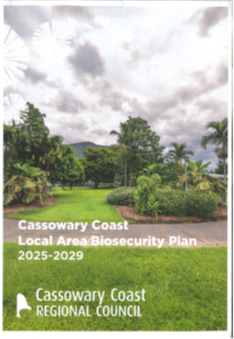Invasive Plants and Animals
We all have an important role to play in controlling pest animals and weeds - whether we own a suburban block or farm, we are foresters, farmers, tourist operators or council employees.
Weeds and pest animals have major economic, environmental and social impacts.
As a landowner it is your responsibility, under the Biosecurity Act 2014, to keep your land free from declared pests.
Cassowary Coast Regional Council can help you, with advice on weeds of top priority and weeds of concern within our region and on animal issues such as possible baiting or trapping programs.
Weeds
Learn About Them
Gathering information before you begin works can save you time and money.
For technical advice on specific weeds, chemical control application rates, other methods of weed removal or control, visit Restricted invasive plants of QLD - Info sheets
Know Your Priorities
Additional information including local distribution, flowering and seeding times etc can also help to inform control strategies. For this information visit the Cassowary Coast Local Area Biosecurity Plan 2025-2029 at (insert link)
The plan highlights levels of control for each catchment area and priority weeds, making it easy to identify what is required for your property.
Cassowary Coast Local Area Biosecurity Plan 2025-2029
Cassowary Coast Prevention and Control Program
Cassowary Coast Survelliance Program
Download your copy from the link above and for clarification on anything, send an email to enquiries@cassowarycoast.qld.gov.au
Council Priorities
Council undertakes:
- Limited control of select weeds in priority areas - often weeds that are not well-established or weeds that are in critical habitat areas.
- Widespread weed control to reduce its spread into uninfected areas and to protect key assets e.g. Singapore daisy.
- Technical advice services
- Property inspections for declared weeds when there are property realignment applications
Categories of Weeds
Under the Biosecurity Act 2014 pest plants and animals are listed as 'restricted' or 'prohibited'.
Prohibited pest species are not present in Queensland. Allowing these species into the state could have major social, environmental and economic impacts. Restricted pest species are already present in the state.
Cassowary Coast Regional Council is responsible for over 5000 hectares of reserves, parks and foreshore from Eubenangee in the north to the Cardwell Range in the south. With a limited number of staff and resources, it is essential that weeds are prioritised, taking into account reproductive cycles and growth habits as well as upcoming weather events, the location (i.e. is it in a critical habitat area?), asset protection and how widespread the weed is.
Features that make a weed:
- Quick to germinate in favourable conditions
- Fast-growing
- Producing lots of seeds and/or reproducing easily from fragments
- May have a seed that will remain viable for many years waiting for the right conditions
- Effective dispersal mechanisms – easily spread by wind, water, animals, machinery, and vehicles
- Often resistant to pests and diseases
Cassowary Coast Regional Council's Top Priority Weeds
- African tulip tree (Spathodea campanulata) – Category 3
- Thunbergia (Thunbergia grandiflora) – Category 3
- Pond Apple (Annona glabra) - Category 3
- Miconia tree (Miconia calvescens) - Category 2,3,4,5
- Mikania vine (Mikania micrantha) - Category 2,3,4,5
- Limnocharis (Limnocharis flava) - Category 2,3,4,5
- Mexican Bean Tree (Cecropia spp) - Category 2,3,4,5
- Koster’s curse (Clidemia hirta) - Category 2,3,4,5
- Hymenachne (Hymenachne amplexicaulis) Category 3
- Kudzu (Pueraria montana) - Category 3
- Siam weed (Chromolaena odorata) - Category 3
- Hygrophila (Hygrophila costata) - Category 3
- Water hyacinth (Eichhornia crassipes) – Category 3
- Salvinia (Salvinia molesta) – Category 3
- Bog moss (Mayaca fluviatilis)
- Aleman grass (Echinochloa polystachya)
- Leucaena (Leucaena leucocephala)
- Amazon frogbit (Limnobium laevigatum)
Weeds of National Significance (WONS)
Weeds of National Significance (WONS) are prioritised by their invasiveness and impacts on the environment, primary industry, biodiversity and conservation values as well as land management and human and animal welfare.
WONS found within the Cassowary Coast region:
- Pond apple (Annona glabra) - Category 3
- Hymenachne (Hymenachne amplexicaulis) - Category 3
- Cabomba (Cabomba spp) - Category 3
- Water hyacinth (Eichhornia crassipes) - Category 3
- Salvinia (Salvinia molesta) - Category 3
- Gamba grass (Andropogon gayanus) - Category 3
- Fire weed (Senecio madagascariensis) - Category 3
Locally Declared Weeds
These pest plants have been identified as a threat due to isolated infestations or several problem weed features. They may also be causing havoc in areas of similar climate, soil types or land tenure.
The Cassowary Coast's locally declared weeds:
- Brillantaisia (Brillantaisia lamium)
- Aleman grass (Echinochloa polystachya)
- Hiptage (Hiptage polystachya)
- Leucaena (Leucaena leucocepala and Leucaena inoculum)
- Bogmoss (Mayaca fluviatilis)
- Bamboo (running) (Phyllostacys spp and Bambusa spp)
- Mother in-law's tongue (Sansevieria trifasciata)
- Yellow allamanda (Allamanda cathartica)
- Glow vine (Saritaea magnifica)
To learn more, see Pest Factsheets on the Department of Primary Industries website. The factsheets cover plant identification, registered chemicals for each weed's control, declared states and growth habits. They also outline ideal locations and climates for infestations.
Advisory Forums
Biosecurity Queensland hosts pest advisory forums four times a year in North Queensland. These forums are an opportunity to learn about new weeds and control methods and to network with weed control experts in your area. For more information visit www.fnqpaf.qld.gov.au.
More Information
Learn more about pests, clean down procedures, chemicals and registration permits for specific weeds or chemicals:
- Far North Queensland Region Of Councils
- Material Safety Data Sheets
- Australian Pesticides and Veterinary Medicines Authority
Legislation
The Biosecurity Act 2014 (the Act) was passed by Parliament and came into effect on 1 July 2016.
Information from the Department of Agriculture and Fisheries website
Panama TR4 Program (Bananas) - Biosecurity Queensland, Department of Agriculture and Fisheries

